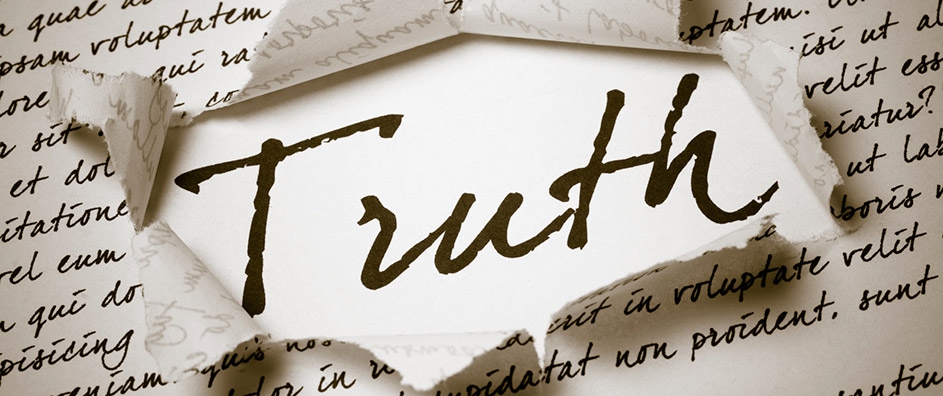The views expressed in our content reflect individual perspectives and do not represent the authoritative views of the Baha'i Faith.
Proofs are of four kinds: first, through sense perception; second, through the reasoning faculty; third, from traditional or scriptural authority; fourth, through the medium of inspiration. That is to say, there are four criteria or standards of judgment by which the human mind reaches its conclusions. – Abdu’l-Baha, The Promulgation of Universal Peace, p. 253.
We all want to base our lives on the truth. No one wants to follow a lie, or believe a lie, or live a lie. Everyone wants to have an authentic existence, and authenticity depends on truth. So how do we determine what’s true? How do we know?
The modern world, filled with so many truth claims, can be a confusing place. However, we do have access to the methods philosophers and pundits and prophets have used to answer this crucial human question for many thousands of years. Most of them list three or four basic ways of knowing the truth. Using these criteria—the “modes of knowing” that allow us to judge the accuracy of claims and statements and acquire real knowledge—we can each attempt to verify what’s presented to us as true or not, and then decide for ourselves.
The Baha’i teachings say that we have four ways of knowing, four “criteria whereby the realities of things are understood:”
Our senses
Our intellect
Tradition or authority
Inspiration
Contemporary philosophers like Jonathan Dolhenty generally agree, listing three functional, effective tests of truth—called Correspondence, Coherence and the Evidence of Authority. Given these three or four basic categories of truth criteria, let’s start our exploration of this important subject by considering how we determine truth with the knowledge our senses provide us.
All of us judge the truth by the evidence our senses collect and present. Maybe that’s why we say something “makes sense”—because we can actually physically verify it. If we see that the ground outside is wet, we can reasonably conclude that it’s raining. We can go outside to test that supposition, and make sure a water pipe hasn’t burst or a geyser hasn’t just erupted. The philosophers call this method of measuring the truth “correspondence,” because it can confirm that our sense-based judgment corresponds to something real. In other words, the truth often becomes clear to us when the perceptions of our senses correspond with reality.
This “correspondence theory of the truth” has become, during the past few hundred years, the chief gauge of reality in the modern world—not only for philosophers but for scientists and educated people everywhere. If we can touch it, smell it, taste it, see it or hear it, we generally believe in its reality. We all just naturally fact-check our daily lives this way—we determine reality, and therefore truth, by making a judgment about something, and then seeing whether it corresponds to real objects, events or people.
The problem with this method of determining the truth? Our imperfect senses can and often do fool us. They don’t always correspond with reality:
…the criterion of the senses is defective, as it can err. For example, the greatest of the senses is the power of vision. The vision, however, sees a mirage as water and reckons images reflected in mirrors as real and existing; it sees large bodies as small, perceives a whirling point as a circle, imagines the earth to be stationary and the sun to be in motion, and is subject to many other errors of a similar nature. One cannot therefore rely explicitly upon it. – Abdu’l-Baha, Some Answered Questions, newly revised edition, p. 343.

The relatively weak human sensorium, science has proven, misses a huge amount of “sensible” information. Hawks and eagles and owls have much better vision; dogs have exponentially better senses of smell; many animals have much more acute hearing—in fact, we know that a great deal of sense-based input completely escapes human eyes, ears and noses. Our minds, fairly easily deceived by that lack of sensory input, or by the relatively low level of factual content our senses provide, often come to the wrong conclusions when we rely solely on what we can physically perceive.
This problem—the fallibility of our senses–has plagued materialistic philosophy since it began.
A materialist basically believes that matter is primary, and concepts like mind, soul or spirit are only the ephemeral product of matter acting on other matter. To a materialist, an idea has no existence of its own, but only comes from an electrical impulse in the brain. By contrast, the idealist philosophers believe that spirit, soul, mind and ideas are primary, and matter secondary. The idealists rely more on our higher rational and spiritual faculties to determine the truth, where the materialists rely primarily on the physical.
So in the next essay in this series on determining the truth, let’s look at that rational human faculty and examine its claims as a truth-determining power.
















Comments
Sign in or create an account
Continue with Googleor